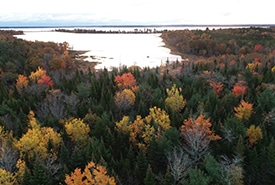This week, as we mark National Forest Week, people are once again reminded of how closely our lives are tied to forests. After another summer of wildfires and smoky skies in many parts of the country, the need to care for forests has never felt more urgent.
It is more important than ever to have collaboration between all levels of government, the private sector and conservation groups to protect our nature-based infrastructure. Forests are one of Canada’s greatest resources and one of our natural assets. Their conservation and stewardship are essential in Canada’s efforts to fulfil its international commitments to nature.
Forests breathe life
Forests cover about 40 per cent of Canada’s landmass. They deliver economic, environmental and societal benefits and make our communities…
This week, as we mark National Forest Week, people are once again reminded of how closely our lives are tied to forests. After another summer of wildfires and smoky skies in many parts of the country, the need to care for forests has never felt more urgent.
It is more important than ever to have collaboration between all levels of government, the private sector and conservation groups to protect our nature-based infrastructure. Forests are one of Canada’s greatest resources and one of our natural assets. Their conservation and stewardship are essential in Canada’s efforts to fulfil its international commitments to nature.
Forests breathe life
Forests cover about 40 per cent of Canada’s landmass. They deliver economic, environmental and societal benefits and make our communities more resilient to the impacts of severe weather and climate change. They filter the air we breathe, cool our communities during heat waves, prevent damage from flooding and support pollination. They also store vast amounts of carbon while sustaining wildlife — from 140 native tree species to more than a third of Canada’s birds — with thousands of different species relying on these critical spaces to survive.
We also rely on forests for our own health and well-being. For generations, forests have served as a refuge for camping, walking, hiking, fishing, hunting while also supporting Indigenous cultural and spiritual traditions.
Community well-being
The forest sector employs nearly 200,000 people across Canada and is the economic backbone of more than 300 communities. Think of all the products we use in our everyday lives, from lumber, paper, flooring and furniture to heating our homes just to name a few.
While Canada’s forests may be abundant, they are under increasing pressure. Southern forests are shrinking from land use change and fragmentation. Invasive pests and disease are spreading. 2025 has been the second worst year on record for wildfires. Canada has lost more than 57 million hectares of tree cover over the past two decades: an area larger than New Brunswick, Nova Scotia and Prince Edward Island combined.
 The Keyhole, NB (Photo Mike Dembeck)
The Keyhole, NB (Photo Mike Dembeck)
The Nature Conservancy of Canada (NCC) is working with partners across the country to conserve, restore and care for forests at the scale this moment demands. Our goal: to protect an additional one million hectares of natural habitats by 2030. Since 1962, we’ve helped safeguard nearly 1.6 million hectares of forest, from the boreal to BC’s coastal rainforests, to Ontario’s Carolinian woodlands and the Wabanaki (Acadian) forests of the Maritimes. This work is done hand in hand with landowners, Indigenous Nations, governments, industry, foundations and generous donors.
NCC and partners collaborate to sustainably manage forests through selective harvesting and prescribed burns. Controlling fuel loads helps mitigate the risks of wildfires. Intact forests prevent soil erosion, flooding and desertification and support the health of people, water, air, soil and wildlife.
Conservation is a shared responsibility. Individuals can support by reducing their footprint, planting trees, volunteering and donate to local conservation initiatives. Businesses can invest in sustainable practices, sponsor forest restoration and partner with organizations like NCC to leave a lasting impact. Every action adds up and contributes to meaningful change.
In the face of climate change and nature loss, conserving nature is Canada’s best investment in a resilient future. Our forests are not just resources: they are our life-support system. National Forest Week is a reminder that caring for them is nation-building work of the highest order. Join us and let’s all play our part.